The Oregon Department of Transportation (ODOT) has a new voice on its transportation team. The agency announced last week that Talia Jacobson would be the new “ODOT Active Transportation Policy Lead.”
Jacobson has been with ODOT as a transportation planner since 2008. In that time she’s worked on major projects like the Southwest Corridor Plan, the Congestion Pricing Pilot Program, the Columbia River Crossing, the Sellwood Bridge and others. Jacobson is a graduate of the urban and regional planning program at Portland State University and she also has a degree in psychology (Whitman College) and a professional background in mental health and social services. At ODOT, she’s used that background to lead internal trainings about diversity and cultural competency.
Asked about what she’ll be working on at the 5,000-employee agency that holds many powerful cards in local and regional transportation decisions, Jacobson said that, “The Bicycle and Pedestrian Mode Plan is at the top of my list right now.” (ODOT began an update to that plan back in April.)
“I’m excited to start thinking about how we can craft policies that lead directly to on-the-ground improvements,” she said via email, “I want to see this plan carry the same weight as ODOT’s other modal plans, so it can play a strong role in how we balance our transportation priorities.”
Jessica Horning, ODOT’s transit and active transportation liaison for Region 1 (Portland metro), worked with Jacobson and described her as “a new emerging leader in Salem.” “As someone who didn’t learn to ride a bike until her 20’s but now uses it as a main mode of transportation,” Horning added, “Talia brings a great perspective on how to get more people on bikes and build a system that serves an “8 to 80″ community.”
Jacobson is 32 and has lived in southeast Portland for the past 10 years. You might recall the guest article she wrote for us back in July about the challenges of being a “klutz” who learned how to ride well into adulthood.
As she gets up to speed in her new role, Jacobson said she wants our feedback. “I’ll be spending the next few weeks doing a tremendous amount of homework. If there are new ideas I should research, policies you consider to be the gold standard, rides I should try, or big thinkers I should take out to coffee, please share your thoughts in the comments!”



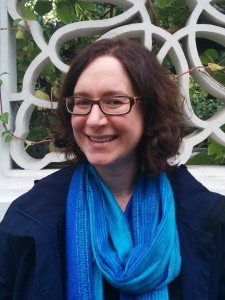
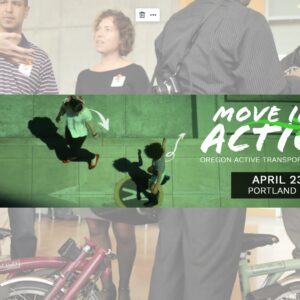
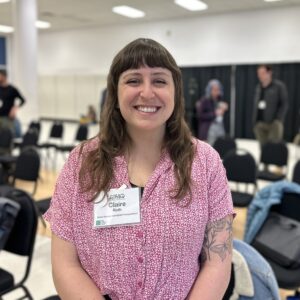
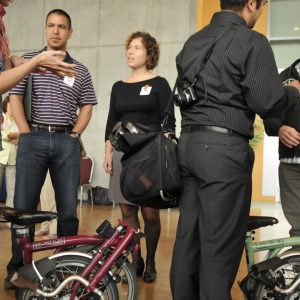
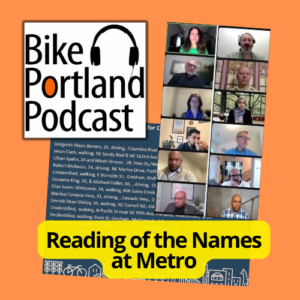
Thanks for reading.
BikePortland has served this community with independent community journalism since 2005. We rely on subscriptions from readers like you to survive. Your financial support is vital in keeping this valuable resource alive and well.
Please subscribe today to strengthen and expand our work.
What is Talia doing to lower the speed limit on SW Beaverton-Hillsdale Highway from 40 to 35? What is she doing to build the Red Electric Trail?
Or all the other streets….Travel speed is the number one factor in road safety regardless of your choice of transport.
I think what I’d most like from ODOT (or PBOT) is a liaison, someone who would stop in here from time to time and answer our questions, give us some perspective on how things look from the inside, and, invariably, why the actions from these bureaucracies always fall so short of the rhetoric. I think it is wonderful to put faces and names to these positions, but at the same time I hold out very little hope that ODOT will in my lifetime figure out how to ‘get out of its silos,’ to quote Matt Garrett. Perhaps Talia and Jessica will prove me wrong. I sincerely hope so.
From my experience working with ODOT over the past 7 years, I can say with confidence that ODOT has an organizational structure problem that places vehicle capacity over ALL other things. Nothing “progressive” (ie. better for bikes, peds, or transit) can be implemented without the approval of the all-powerful traffic oracle in Salem, who is programmed to prioritize auto movements. It is the Oregon Highway Department in everything but name.
The best thing ODOT could do for bikes, peds and transit systems is to hand over the surface streets they manage like Barbur Blvd, Powell Blvd, 82nd Ave, etc, etc so that cities can improve access within their communities and be responsive to residents’ needs.
Good luck to Talia in her new endeavors – she’ll need it!
Agreed regarding the handover. Most jurisdictions hold out for money to improve the state roads before they agree to take control. Then there is the inventory of what’s on the roads. What they miss is the opportunities to affect local safety immediately and well into the future.
Wow, that is not very encouraging. Normally I feel like a crank, complaining as I do about ODOT, but here you are saying essentially the same thing coming from the inside. Got any suggestions for how to fix this? Matt Garrett sure has been a disappointment.
Most in PBOT and City Council look at the cost to improve the roadway and see a deficit, missing the big picture of the annual cost to local users. Most jurisdictions use a benefit-cost ratio that only considers capital costs and short-term benefits. If all projects considered the 20-year life-cycle costs, including capital, delay, crashes, and emissions (there are more), taking over these streets would probably pencil out well. Also, it’s not like ODOT is going to turn it’s back on roads it still want’s designated as state highways.
I also find this very encouraging. ODOT has been a real barrier to improvements in a lot of places. It’s good to see this change.
“If there are…big thinkers I should take out to coffee, please share…”
El Biciclero, Spiffy, Paul in The ‘Couve, are, RJ, Todd Boulanger, Doug Klotz, Aaronf, Joseph E, Anne Hawley, Brian Davis, Ted Buehler, Lenny Anderson, Kirk, J_R, Chris Anderson, spare_wheel, Opus the Poet, dr2chase, Barbara, Alex Reed, Q’Tzal, and don’t forget Jonathan & Michael.
Man, what a fine group we’ve got here! And I apologize to those scores whose usernames didn’t come to mind as quickly, who’s thinking has also influenced mine here in the bikeportland comments section.
I’m honored to be included in this list, 9watts. And I’d be happy to join any Portland area discussions Talia wants to have about active transportation, particularly among the over-50 population.
Congratulations to Talia. I hope she helps cities and towns (other than Portland and Eugene) build active transport systems. Maybe she can help kill the 3rd bridge in Salem.
Speaking of Salem, here’s another state employee who lives in Portland and works in Salem. If all of you Portlanders who work in Salem lived here it might make our town a better place to live while reducing the amount of traffic on I-5 and a the city streets.